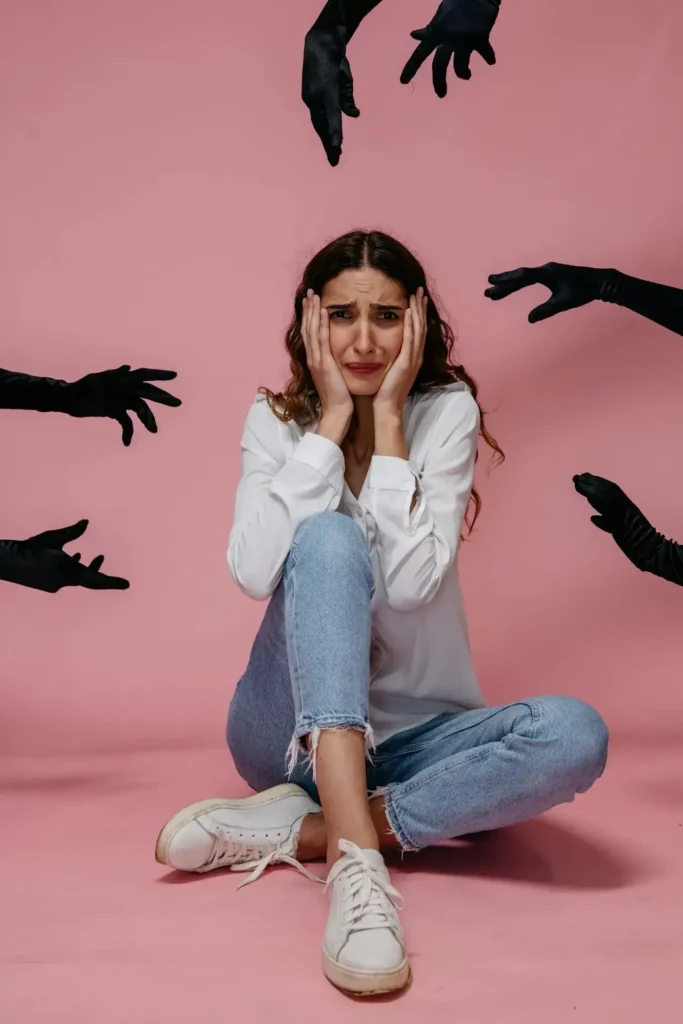Specialized Online Therapy for
Phobias & Fears in New Jersey
With online therapy for phobias and fears, you can effectively manage and overcome these challenges.
Phobias and fears are highly treatable, and our dedicated therapists are here to support your journey.

Understanding Phobias
Phobias go well beyond ‘feeling scared’. They are intense, irrational fears of specific situations, objects, or activities that can be debilitating, affecting a person’s ability to function normally in daily life. Understanding the nature of phobias is the first step towards effective treatment.
Symptoms of Phobias
- Marked fear or anxiety about a specific object or situation
- The phobic object or situation almost always provokes immediate fear or anxiety.
- The fear or anxiety is out of proportion to the actual danger posed by the specific object or situation.
- The phobic object or situation is actively avoided or endured with intense fear or anxiety.
- The fear, anxiety, or avoidance causes clinically significant distress or impairment in important areas of functioning.
- The fear, anxiety, or avoidance is persistent, typically lasting for 6 months or more.
- The disturbance is not better explained by the symptoms of another mental health issue, trauma or the use of substances
Types of Phobias Treated by Our Expert Counselors
This type of phobia is triggered by a specific event, object, sensation or stimulus.
- Animal Type (e.g., spiders, insects, dogs)
- Natural Environment Type (e.g., heights, storms, water)
- Blood-Injection-Injury Type (e.g., needles, invasive medical procedures)
- Situational Type (e.g., airplanes, elevators, enclosed places)
- Specify type: Other Type (e.g., phobic avoidance of situations that may lead to choking, vomiting, or contracting an illness; in children, avoidance of loud sounds or costumed characters)
Complex phobias aren’t triggers by a single event, object or stimulus, making these phobias more difficult for people to manage. Generally, individuals can identify more anxiety and panic feelings in some specific situations, though often report it can feel “unpredictable” or “inconsistent”. The most common complex phobias are social phobia & agoraphobia.
Social anxiety disorder, also known as social phobia, is a mental health condition characterized by an overwhelming fear of social situations where one might be judged, embarrassed, or scrutinized by others. People with social anxiety often avoid activities such as speaking in public, attending social gatherings, or even engaging in everyday interactions like making phone calls or talking to strangers. In more severe cases, the anxiety can be so intense that it interferes with daily life, leading individuals to isolate themselves and avoid any situation that might trigger their fear of social evaluation.
Agoraphobia is characterized by an intense fear of being in situations or places where escape might be difficult or embarrassing or where help is unavailable, leading individuals to avoid leaving what they perceive as safe environments, like their homes. This fear can result in avoiding various public places, including shopping centers, supermarkets, public transportation, and even seemingly tranquil locations like empty parks or quiet churches. In extreme cases, individuals with agoraphobia may remain confined to their homes for extended periods, sometimes lasting months or even years.
Panic disorder is a mental health condition marked by recurrent, unexpected panic attacks—sudden episodes of intense fear or discomfort that reach a peak within minutes. Individuals with panic disorder often live in fear of when the next attack might occur, which can lead them to avoid situations or places where they believe an attack could happen. This avoidance can disrupt daily life, making it difficult for them to engage in normal activities, go to work, or even leave their home. In severe cases, the fear of experiencing another panic attack can become so overwhelming that it significantly limits a person’s ability to function.
Common Symptoms of Phobias
These symptoms are related to the thoughts associated with phobias including:
- Irrational Thoughts
- Disproportionate Fear/Worries
- Overthinking/Overanalyzing situations in which the trigger may present.
Behavioral symptoms are the action based behaviors individuals have in response to anxiety and fear. This may include avoidance of the feared situation/object.
Many clients report that these symptoms are most disruptive and frightening. Physical symptoms include:
- Increased heart-rate
- sweating
- dizziness
- nausea
- panic symptoms aka the “fight or flight” response
Types of Therapy for Phobias & Fears
Exposure Therapies for Phobias
Direct Exposure Therapy
This type of exposure is an in-person, in real life, direct exposure to the feared stimulus. This includes exposure to bugs, animals, driving, etc. This is a commonly used approach for clients and providers.
Virtual Reality Exposure Therapy
An immersive environment is created that allows you and your therapist to slowly experience the feared situation in s structured and guided way. VRT makes therapy for fears and phobias more accessible and less intimidating than traditional exposure therapies.
Imaginal Exposure Therapy
Here, clients “imagine” the feared stimulus with their therapist or narrate details of the feared stimulus or trauma. The goal is that, through recalling and describing the stimulus, the client becomes less sensitive, decreasing the “fight or flight” response.
In-Vivo Exposure THerapy
Clients engage in activities that gradually expose them to the stimulus. Clients also develop a hierarchy of avoided activities that the patient practices through in vivo exposure between sessions.
Alternative Treatments for Phobias & Fears
Ketamine Assisted Psychotherapy
Mind by Design offers online and in-home Ketamine Assisted Psychotherapy in New Jersey. In combination with psychotherapy, KAP enables you to tap into altered states of consciousness and harness the biological benefits of psychedelic medicines.
Cognitive Behavioral Therapy
Cognitive behavioral therapy focuses on changing thoughts and behaviors associated with the patterns of the stress response to a feared stimulus. CBT is designed to help identify the negative thoughts and maladaptive coping mechanisms.
Somatic Therapy & Mindfulness
Somatic Therapies and Mindfulness are therapeutic approaches that focus on fostering relaxation and body awareness during stressful experiences. Through these approaches, clients will develop skills to control and comprehend the bodily responses to stress, fear and anxiety.
Differentiating Between Panic Disorder & Phobias
Triggering of Panic Attacks
Individuals with certain phobias may experience panic attacks when confronted with the object of their phobia. For example, someone with a severe phobia of flying might have a panic attack when boarding an airplane. In this case, the phobia directly triggers the panic disorder symptoms.
Avoidance Behaviors
Both conditions can lead to avoidance behaviors. In panic disorder, a person might avoid situations where they fear a panic attack could occur. Similarly, someone with a phobia might avoid the specific object or situation they fear. Avoidance limits a person’s daily functioning, increasing overall anxiety.
Comorbidity
It is not uncommon for panic disorder and phobias to coexist. For example, a person with panic disorder might develop agoraphobia—a fear of being in situations where escape might be difficult—due to the fear of having a panic attack in public or unfamiliar places.
Cycle of Fear
Both conditions can create a cycle of fear, where the anticipation of fear or panic leads to increased anxiety, which in turn can lead to the very symptoms the individual is trying to avoid. This can make both panic disorder and phobias challenging to manage without treatment.
Start Working with a Therapist Today!
FAQ about online therapy in new jersey
Where are you located? I need a therapist near me
We are fully online, which means that your therapy sessions will be help via video call on our HIPAA compliant Platform. Anyone in New Jersey can access our therapy services
How do I get started as a new client?
New Clients can reach out to us directly via call, text or email here:
Does my insurance cover my visits?
We provide”Courtesy Billing” for clients who are using the Out-of-network insurance benefits.
Our Insurance Page might answer your questions about your insurance information, cost and OON coverage.
What are out-of-network benefits?
Visits our FAQ About Insurance to learn more about OON coverage for mental health services. We can also check your benefits for you. When using OON benefits, patients typically pay the full cost of the treatment upfront and then file a claim with their insurance company for reimbursement.
Is Online Therapy As Effective As In-Person Therapy?
Online therapy is essentially face-to-face counseling, just conducted remotely. Studies show that tele-therapy is as effective as traditional counseling. Professional organizations and state governments recognize its benefits and have set regulations for it. However, like any therapy, its success in achieving your goals isn’t guaranteed. It’s important to discuss with your therapist whether tele-therapy is working for you.
How Should I Prepare for My First Session?
Showing up is all that you need to do! But if you really want to get the most out of session, it could help to take some time to think about what you want from therapy. It helps to write down your goals, questions you have or things that you feel are important to share.
Do you offer traditional talk therapy?
of course! though we have some unconventional therapy approaches, we are rooted in evidenced based practices. Talk therapy is a major player in the therapy room! See What we Treat and Integrative Services for more information
Is Virtual Counseling Suitable for Everyone?
Online therapy might not be as effective for individuals with chronic suicidal thoughts, severe trauma, significant mental health history, or those recently in intensive care. Such cases often benefit more from traditional, in-person counseling. We’ll help you decide if our online services are right for you during your intake and evaluation.
Can I Change Therapists If I'm Not Happy?
Yes, you can switch therapists to another provider within the practice, or we can provide you a referral if preferred. We want to ensure that your time and effort are well spent, and that you are getting the relief you need, that’s why we work collaboratively with each other in the practice, as well as outside therapists who we know and trust.
How Do I Know If Therapy Is Helping?
You should feel like you’re making progress. Signs it’s working include:
- Feeling comfortable talking to your therapist
- Your therapist respects boundaries
- You’re moving towards your goals
- You feel listened to
You’re doing better in life - Your self-esteem is getting better
What is your cancellation policy?
We ask that clients provide at least 24 hours notice in the event that they need to cancel to avoid the 50% cancellation fee. we understand that life happens and do our best to be flexible & reschedule.
What Geographic Areas Are Served?
Currently, we serve clients in New Jersey and are expanding to other states as telehealth laws evolve. While telehealth offers the convenience of attending sessions from anywhere, state laws require clients to be in-state during their session.
Is Online Therapy Easy to Use for Non-Tech-Savvy People?
Yes, it’s pretty simple to access sessions. You’ll need basic internet skills, such as opening and visiting the patient link sent to you via email. It’s similar to video chatting like Facetime or Zoom. We can also walk you through it on the phone the first time to ensure a strong connection
What Questions Should I Ask My New Therapist?
Feel free to ask anything. Some good questions are:
- How often will we meet?
- What do you specialize in?
- What experience do you have with my issue?
- What outcomes can I expect?
- How will I know I’m progressing?
- How long do you usually work with clients?
- How will we set my treatment goals?
What is the difference between associate therapists & fully licensed therapists?
Our Qualifications:
Our founder, Rebecca Sidoti, is a highly qualified, state-licensed therapist and supervisor with extensive training in anxiety related disorders and innovative treatment such as Ketamine Therapy. Mind by Design Counseling adheres to standards set by the our governing counseling boards.
To see each providers credentials, training and licenses, visit our “Meet the Therapists” Page to learn more.
- LAC/LSW are therapists who may practice clinical work under the supervision of a fully licensed therapist.
- LPC/LCSW are therapists who have completed the necessary clinical hours post-graduation under supervision and can practice clinical work independently.






